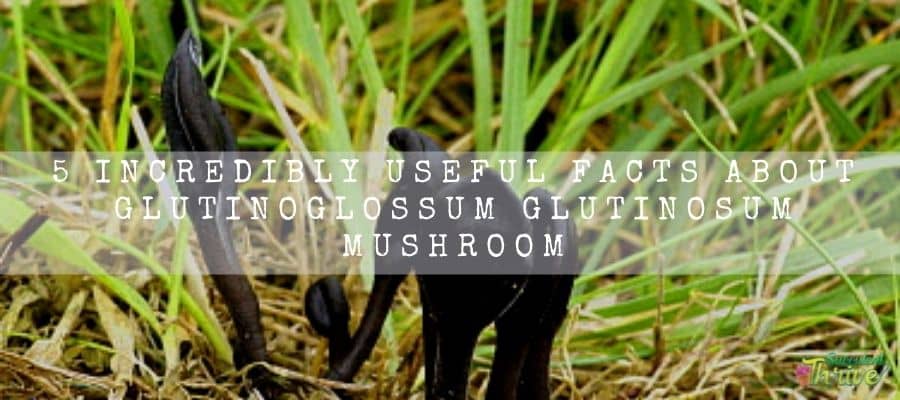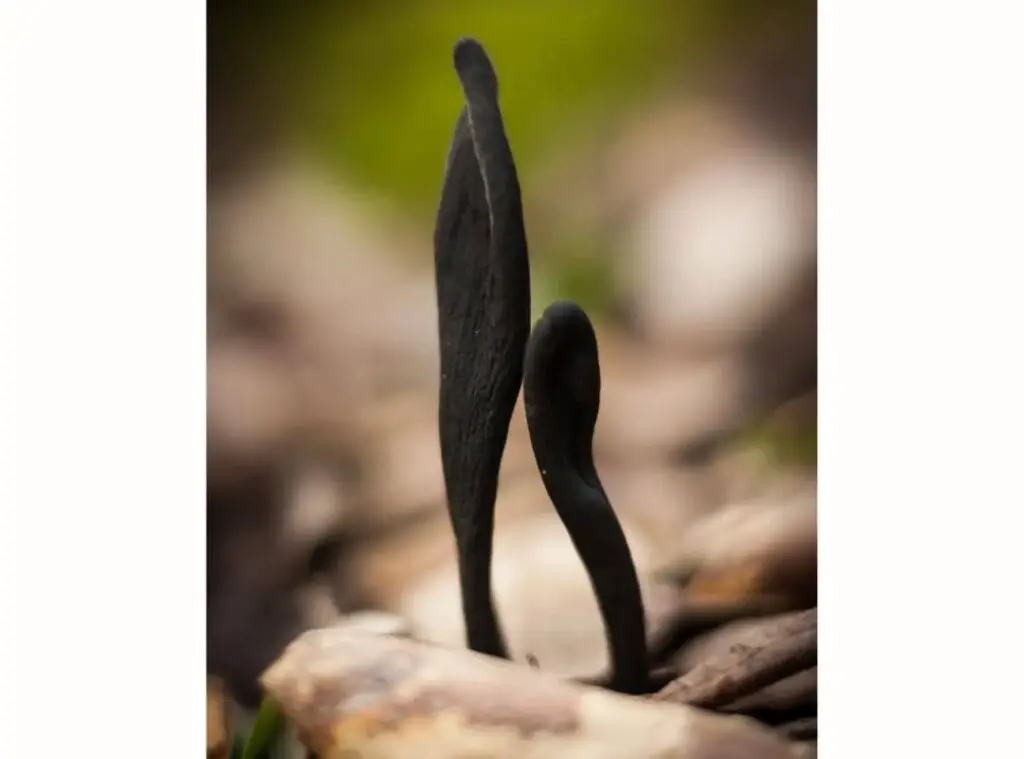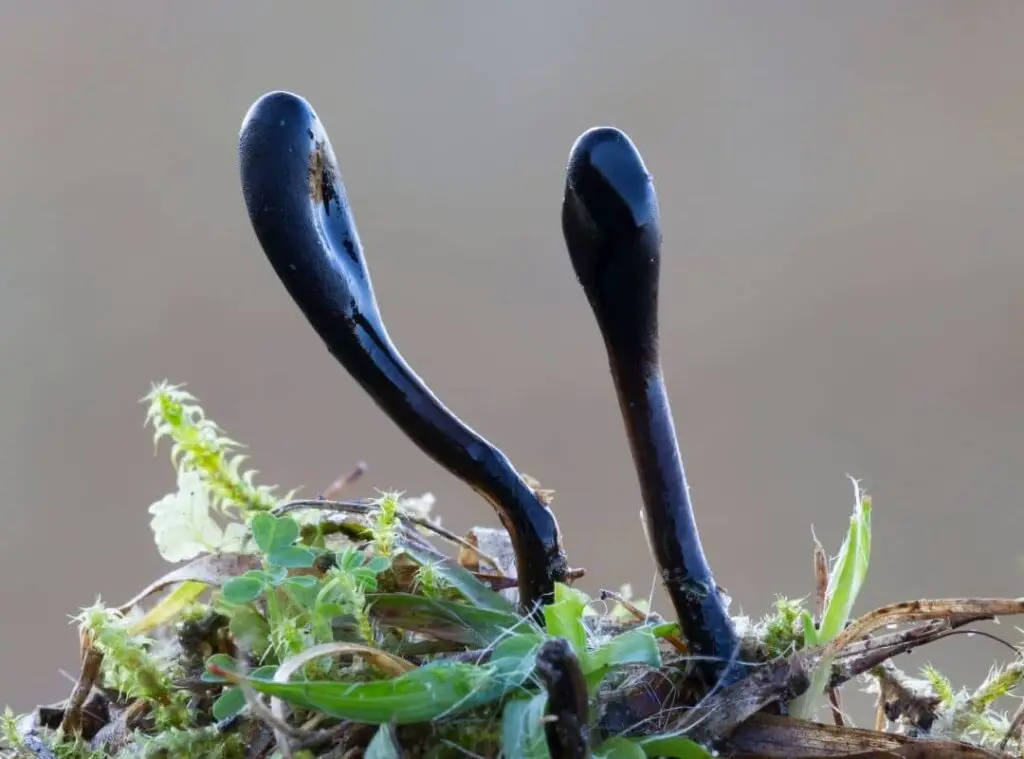Black earth tongue (Glutinoglossum glutinosum) is the scientific name of the black earth tongue mushroom. It is a fungus type which belongs to the family Geoglossaceae.
Family Geoglossaceae is commonly introduced as earth tongues while black earth tongue mushroom is commonly known as viscid earth tongue or the glutinous earthtongue.
You could spot them widely in the Northern Hemisphere. Further you could spot them grown in northern Africa, Asia, Europe and in North America as well.
Black earth tongue is a saprophytic species. Its natural habitat usually would be soil, moss or grassy areas.

They have so many similarities with several other black earth tongue species particularly in terms of appearance.
Using a microscope would be quite useful here to identify them. For example we can use spores, asci and paraphyses for the identification. This fungus changes as time passes.
If we consider the earth tongue in general, they tend to take a tongue shape as they grow. Further they would consist of sterile strips as well.
To elaborate further on their head, it would consist with which runs through the to the center of the body.
Further they would consist of two lobes on each side which have a similar shape, and which look alike.
Easy Identification guide
| Common name | Viscid black earth tongue Glutinous earthtongue |
| Scientific name | Glutinoglossum glutinosum |
| Odour / taste | Not Distinctive |
| Habitat | Moss, Wood Grasslands. |
| Season | Summer through fall |
| Similar species | Xylaria polymorpha Trichoglossum hirsutum (Common name hairy earthtongue). |
How To identify
Basically it is tongue shaped and emerged from the earth.
The fruitingbody (the part above the ground) consists of a black head and dark brown stripes. They grow up to 1.5 – 5.0 cm. The black, fused or narrowly ellipsoid head is around 0.7 cm long.
The pear-shaped or spherical tips of the paraphyses extend beyond the asci.
The spores are smooth and cylindrical, sometimes with a slight swelling in the middle, and sometimes slightly curved;
The thin-walled asci (spore-bearing cells) are cylindrical to narrowly club-shaped, eight-spored, and typically measure 200–265 µm long by 12–16 µm wide.
Ascospores occupy about the upper two-thirds to three-quarters of the ascus, leaving a hyaline (transparent) base.

Life cycle of earth tongue mushroom
These usually comprise four to eight ascospores’ sexual stages of life span. These fungi have been segregated into two subgroups depending on the asci formation.
Chances are that they could arise singly or arise in several types. Further they are segregated into subgroups depending on the discharge mode of the ascospores.
Distribution of earth tongue mushroom
When it comes to the habitat , their fruit bodies usually form scattered on soil, moss or in grass areas.
In North America, you could mainly spot them in hardwoods while in Europe you may find them in pasture or in dune slacks.
This acts as a quality indicator of grasslands particularly in the UK. Literally, if they consist of a grassland, it is considered as a medium quality grassland.
On the other hand, black earth tongue habitat in countries like India would be usually soil of oak forests, moss and on stony slopes of places which have an elevation of 2000m.
In addition to aforesaid countries, you could find them grown in Asia, Bhutan, China, India, Japan and even in the Philippines.
This species is regarded as a vulnerable species in Switzerland. On the other hand, this is a species which is regarded as a highly threatened species of extinction due to agricultural activities, environmental changes and due to land pollution in Bulgaria.
Further global warming and drought are a couple of other reasons which have caused us to consider them as endangered species.

Are they toxic?
They are not toxic. Black earth tongue mushroom does not consist of any poisonous toxins.
Earth tongue mushroom edible
Many people do not tend to eat earth tongue mushrooms a lot. However, Charles Mcllvaine has stated it is delicious in one of his works in as early as 1902.
Importance of earth tongue mushroom
Fungi is a familiar subject for humans from the day they learnt about leavened bread baking and on wine formation from grapes.
Specially the ancestors were well aware of the benefits of these fungus particularly in the agriculture field. You may use them to decompose forest litter.
Fungi usually occupy almost everywhere like in soil, air, lakes, rivers, seas within the plants and animals, food clothing and even in the human body.
They could break down the organic matter and emit gases such as carbon Oxygen Nitrogen and phosphorus into the surrounding.
In addition to that, many household and industrial activities could also be benefitted from fungi. To elaborate further, they are useful for making bread.
Further they are quite important for the manufacturing of wine, beer and a certain cheese type as well.
In addition to that, they are used as food items particularly in certain mushrooms, morels and in truffles.
Further they are used to produce food items which have a high component in protein as well. Moreover, many studies on fungi have paved the way to accumulate biology knowledge.
Apart from that, it has been quite useful for genetic studies as well. Not only that but also, it has been quite vital to further study molecular biology and genetic engineering too.
Read Next: 15 Things You Probably Didn’t Know About Minnie Belle Aloe Succulent Care
